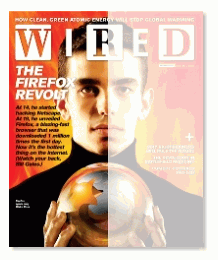 Chris Anderson, author of the Long Tail and the editor-in-chief at Wired Magazine, has written two (1, 2) though provoking posts outlining how online media might work in the future. In his second post, he outlines his vision for "radical transparency" by the media. There is some great thinking here. Describing the posts simplistically, Anderson wants to not only show readers what’s behind the curtain at Wired, but let them help control the wizard. Following are the main elements of this "radical transparency" (presented in quotes) and my quick thoughts on each:
Chris Anderson, author of the Long Tail and the editor-in-chief at Wired Magazine, has written two (1, 2) though provoking posts outlining how online media might work in the future. In his second post, he outlines his vision for "radical transparency" by the media. There is some great thinking here. Describing the posts simplistically, Anderson wants to not only show readers what’s behind the curtain at Wired, but let them help control the wizard. Following are the main elements of this "radical transparency" (presented in quotes) and my quick thoughts on each:
(1) "Show who we are. All staff edit their own personal ‘about’ pages, giving bios, contact details and job functions."
Absolutely. I think another key here is to have the reporters actually interact with users via comments, posting clarifications and engaging in friendly bickering. Do this in real time, not through some delayed mailbag type of feature.
(2) "Show what we’re working on. We already have internal wikis that are common scratch pads for teams working on projects. And most writers have their own thread-gathering processes, often online. Why no open them to all? Who knows, perhaps other people will have good ideas, too."
I think it is a great idea to encourage users to submit story ideas and tips or even to ask for input in certain instances. But, frankly, as a magazine reader I don’t think I’d be that interested in knowing everything a magazine is researching. It is just sort of too much. I’d worry this would be used and abused more by interested parties (PR firms, companies, etc.) trying to impact stories before they are written than real people.
(3) "Process as Content. Why not share the reporting as it happens, uploading the text of each interview as soon as you can get it processed by your flat-world transcription service in India?"
I’m a big proponent of publications including the source documents when they publish a piece. And this may make sense for some big cover story type of thing. But in most cases I’m just not going to care. I want to read the short and sweet version and then dive into the source materials if my interest is piqued. Not the other way around. And once again, in most cases the only ones who will care are interested parties trying to slant the story.
(4) "Privilege the crowd. Why not give comments equal status to the story they’re commenting on? Why not publish all letters to the editor as they’re submitted (we did that here), and let the readers vote on which are the best?"
On the comments, no thanks. I think allowing comments on every story is enough. I’m comfortable with the comments being below the story. Of course, Anderson may have some way of doing this design wise that I can’t envision. On the letters to the editor, absolutely. This is something that came up in a follow up to our 9 Ways to Improve Newspaper Websites post. I would love to see this process opened up.
(5) "Let readers decide what’s best. We own Reddit, which (among other things) is a terrific way of measuring popularity. Why should we guess at which stories will be most popular and give those preferential treatment?"
Absolutely. This is exactly what I was hoping for when they bought Reddit. I would just say that there is a sweet spot between a popularity-based news view and an editor-controlled view that hasn’t really been hit on yet (I know Netscape is trying). How about giving the user the ability to switch between the popular and editor views of the site? This was what we tried in our redesign of USA Today.
(6) "Wikifiy everything. The realities of publishing is that at some point you push the publish button. In the traditional world, that’s the end of the story. It is a snapshot in time, as good as we could make it but inevitably imperfect. The errors (and all articles have them) are a mix of commission and omission–we hope for the best yet brace ourselves for the worst. But what if we published every story on a wiki platform, so they could evolve over time, just like Wikipedia itself? The original story would be the foundation of what could eventually become a version expanded and updated by readers."
Great idea. The web isn’t print. Let the story be a living breathing thing and not something disposable.
You can read his full post here. Let us know what you think in the comments.
Update: Netly News has a good piece exploring another problem with this approach: giving away scoops to competitors.
Update 2: Jeff Jarvis weighs in.
Sign up today to have our latest posts delivered straight to your inbox.